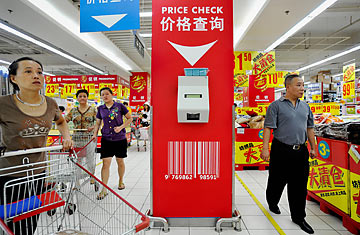
Customers shop at a supermarket in Shanghai.
A Wuling minivan dealership on the outskirts of the western Chinese city of Xi'an provides hope for the future of the global economy. On an ordinary Wednesday morning, customers steadily stream into the showroom, briefly open and close the doors to the displayed minivans, manufactured by a joint venture between General Motors and two Chinese carmakers, and then march over to the front desk to plop down their money. While salesmen in the U.S. struggle to move cars off their lots, Xu Zhanrong, the deputy general manager of the Xi'an dealership, can barely keep the Wulings in stock. Sales are up some 40% this year, Xu says, with about 50 customers a day driving off with new minivans. "From what I see, people are changing very dramatically," Xu says. "Before people thought: I only buy what I need. Now people are starting to spend for a better or more comfortable life."
Xu's words should be music to the world's ears. As debt-laden consumers in the U.S. retrench, increasingly wealthy Chinese consumers could become one of the most important sources of growth for the global economy. Shoppers in China are opening their newly stuffed wallets wider than ever. Passenger car sales surged 76% in October from a year earlier, while overall retail sales jumped 16.2%. Such spending has contributed to China's robust recovery from the global economic crisis. Gross domestic product grew a hefty 8.9% in the third quarter from a year earlier.
There is reason to believe such eye-popping spending can continue. As more regions of China's vast hinterland join in its amazing economic boom, more and more of the country's 1.3 billion people can afford cars, refrigerators and flat-panel TVs items not too long ago considered luxuries for a fortunate few. Chen Baogen, Xi'an's mayor, says his city of eight million had lagged behind towns on the export-oriented coast, but now incomes are growing to the point where consumption is taking off. In the first nine months of 2009, retail sales in the city increased by 19%, well above the 14.8% growth posted in China's cities nationally. "Xi'an has reached a very important development stage," Chen explains. "Incomes are just at the first point when people can buy homes and cars."
Yet whether or not they will buy remains an open, and crucial, question. Even though Chinese are becoming wealthier, they are actually saving a greater percentage of that new wealth. Cornell University economist Eswar Prasad figures that China's average urban household saving rate reached 28% of disposable income in 2008 — 11 percentage points higher than in 1995. As a result, the role consumer spending plays in China's economy continues to head in the wrong direction. Private consumption accounted for a mere 35% of GDP in 2008, down from 46% in 2000. China's ratio stands at about half that in the United States, and even trails the level in comparable emerging markets, such as India, where the share is 57%. What those figures tell us is that Chinese consumers may be spending more, but not nearly enough to ensure sustainable growth for the Chinese economy down the road. "The consumer revolution already has been happening, but it could be much, much better," says Yuwa Hedrick-Wong, an economic advisor to MasterCard Worldwide.
The problem, says Hedrick-Wong and other economists, is that the average Chinese still faces too much uncertainty about the future to spend more freely. China's social safety net systems remain weak, forcing Chinese families to squirrel away large sums to care for elderly parents, pay rising medical bills and prepare for retirement. Aware of the problem, the Chinese government has been taking steps to beef up welfare programs to alleviate the financial burden faced by Chinese families and loosen their purse strings. Beijing, for example, is undertaking a three-year, $125 billion program to build hospitals and clinics to extend healthcare to 90% of the population. Along with these very long-term efforts to boost consumer confidence, the government has also implemented short-term measures to spur on spending. Car sales this year have been boosted by tax breaks and China's own "cash-for-clunkers" program. Xu Zhanrong's Wuling minivan sales have been helped along by a special 10% rebate offered on certain vehicles to residents of rural areas, who make up a majority of Xu's customers.
